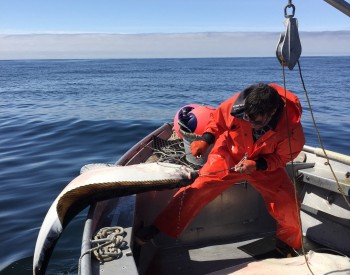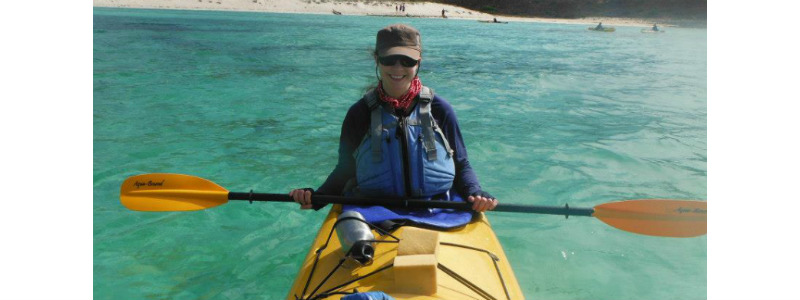In the face of serious threats to our nation’s fisheries, fishermen, conservationists, and scientists are coming together to influence policy-makers, educate the public about where our seafood comes from, and support family fishermen and the habitat on which they depend.
From author Paul Greenberg’s American Catch to the makers of The Breach documentary about wild salmon, more and more voices are rising up to urge Americans to know where our seafood comes from and to recognize the tremendous value in our local, sustainably harvested fish and shellfish. Yet, our nation’s fisheries are facing a number of serious threats.

Ecotrust Fisheries program manager Megan Mackey snapped a shot of this independent longline fisherman hauling in a 100-pound halibut in May 2015 near Sitka, Alaska.
In Alaska, millions of pounds of Pacific halibut are being discarded as bycatch by Washington-based trawlers in the Bering Sea, snatching it from Alaskan halibut fishermen and depriving Americans of healthy protein. The North Pacific Fishery Management Council, one of eight such councils charged with managing our nation’s fisheries, meets this June in Sitka to consider whether to allow this incredible waste to continue.
Also in Alaska, the threat of the Pebble Mine looms over the world’s largest wild sockeye salmon run in Bristol Bay. This proposed copper and gold mine would permanently damage Bristol Bay ecosystems and harm wild salmon populations. All the gold in the world is not worth the potential destruction of one of the top producing wild Pacific salmon systems.
Here in America, despite our billions of acres of ocean territory and ample access to healthy seafood from our nation’s waters, a shocking 91 percent of the seafood Americans eat is imported from overseas — including from areas that have looser regulations for sustainable harvesting, use high doses of antibiotics in fish farms, or are connected to slave labor in their fishing industries.
In May, Representative Don Young (AK) introduced H.R. 1335 that would amend the law that governs all fisheries in our federal waters, the Magnuson-Stevens Act (MSA), by removing rebuilding requirements for depleted fish stocks, undermining science-based actions to prevent overfishing, and removing environmental safeguards required by the National Environmental Policy Act. President Obama recently released a statement in opposition to this bill, and hopefully members of Congress will take note and vote against this shortsighted piece of legislation.
Luckily, in the face of all these threats, fishermen, conservationists, and scientists are coming together in coalitions like the Marine Fish Conservation Network to urge policy-makers to protect the MSA from rollbacks. Groups like the Fish Locally Collaborative are urging the public to get to know their fishermen and know where their seafood comes from. The team behind the The Breach is holding screenings around the nation to raise awareness about the danger posed by the Pebble Mine.
And people are taking notice.
Here at Ecotrust, we are focusing on investment in the viability of our regional fishing communities and the resources on which they depend through our work with the Community Fisheries Network, we support the restoration of streams and rivers for salmon and communities, and we work to restore and protect high quality estuarine habitat for native fish and wildlife.
We need to invest in our fisheries, our marine environment, and the fishing families who bring high quality seafood to our tables. Our nation’s fisheries are a precious resource and they deserve our support. Know where your seafood comes from, and support your local fisherman.
This post originally appeared on the EcoTrust blog.


